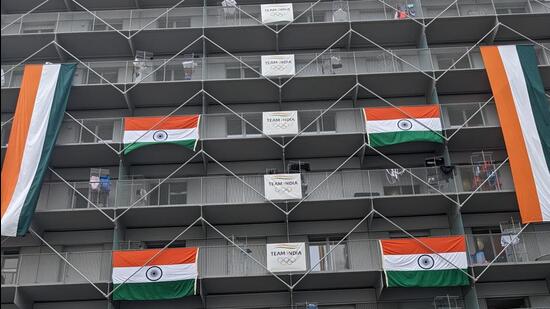
Why Paris is a different kind of Olympics
9 months ago | 78 Views
Before the start of an Olympic Games, every host city digests being dissed by the English-speaking world. Athens wasn’t ever going to be ready on time. The air over Beijing would kill everyone. Rio had the Zika virus and skyrocketing crime would strip champions of medals and reporters of their cellphones. How would Tokyo ever going to manage in its cling-filmed Covid bubble? Skipping past London 2012 has a reason. Where the most serious pre-Games issue appeared to be a shortage of security guards. No kidding.
As consumers of the world’s English-language media (mainly from the UK and USA, supported by Australia and Canada), Indians are always being presented with every Olympics being an absolute catastrophe before it begins, particularly those held in the non-Anglo world. Every single time. Paris2024 naturally, is a construction zone abandoned by its citizens and its mayor had to jump into the Seine to prove its water was suitable for triathletes and marathon swimmers. The Financial Times of London has declared Paris is hosting, “an ambitious but yet risky version of the Olympics.” The Athletes Parade down the Seine in a flotilla of boats is, according to a security expert quoted by FT, a “criminal folly.”
By hosting what is promised as the greenest, most sustainable and most gender equal Olympic Games, Paris 2024 wants to rewrite the Games’ familiar and somewhat tired template – of gigantism, extravagance and white-elephant creation. Rather than the FT’s description of it as ‘risky’, think of Paris 2024 as daring. Or as the French call it, l’audace.
It is not easy – already there has been pushback against the news that the rooms at the Athletes Village will not be air conditioned but will rely on a geothermal cooling system (via pipes under flooring) which reduces outside temperatures by six degrees C cooler. According to the Washington Post, the US, Britain, Australia, Germany, Canada and Italy are planning to bring their own portable ACs. Do take note of who have thrown toys out of cots over air conditioning without even trying out geothermal cooling.
First World pressure has forced the Paris organiers to order 2500 portable AC units that can be hired during the Games. How do those who talk loudest about environmental issues on global plaforms find it so difficult to find a balance between high performance and sustainability? Paris 2024 is approaching and overturning what was considered de riguer in global sporting mega events – to start with, infra and organizational contracts to their organiser buddies.
In May 2018, Paris 2024 launched the ESS2024 Solidarity Platform focusing on a unique distribution model for the €3b purchases and contracts rising out of the organization for Paris2024. Working with the Bangladesh-based Yunus Centre for Social Business and the French NGO Les Canaux, Games organisers sought to focus Games business and work opportunities around local entrepreneurs committed to sustainability and urban renewal. ESS2024 has meant, according to Marie Sallois, IOC director for sustainability, “opening Games-related contracts to those who need them most, as well as small and medium-sized and social businesses.”
A March 2024 IOC announcement said 460 such local business had been signed up to be part of the construction, catering, furniture and laundry services for the Games. It included handing out €1.6b cleaning and laundry contracts to nine local businesses. Eleven thousand chairs across two venues have been created out of plastic waste; three young French students had started a student project for recycling plastic waste which has been turned into Le Pavé project which has provided Olympic venue seating. Paris2024 has built one permanent sports facility specifically for the Games: its Olympic Acquatic Centre, which will become a public swimming teaching, training and event centre after the Games.
Paris 2024’s has been advised by the philosophy behind the Yunus Centre. In September 2021, in an online conversation organized by the Abhinav Bindra Foundation, Nobel laureate Mohamad Yunus wanted to the world to look at sporting events like the Olympics from a lens other than its revenue-generation.
Yunus, Bangladeshi economist, banker, philanthropist and pioneer of microfinance/ microcredit, said that while the power of sport was instantly recognized by “commercial institutions and businesses” who use it for their financial benefits, what is not used as effectively was the “social power” of sport. Sport in fact had, Yunus said, “a 360-degree power” to reach every part of society. “We can benefit tremendously if we use that power for social goals without interrupting sport’s businesses benefits.” Events like Paris 2024, he said, could be used to meet social goals without in any way diminishing its economic benefits. Of tapping through youth and sport, the collective interest that exists, he says, alongside self-interest in every human being.
With its sustainability mission, Paris 2024 has tried to find a unique way to address what Yunus called were the planet’s three inter-connected crises – global warming, wealth inequality and unemployment. Yunus’ eventual aim is called the Three Zeroes - zero net carbon emissions, zero wealth concentration and zero unemployment. Addressing the global warming crisis, he said, “We always keep saying, okay, by 2050 we’ll do this, we’ll do that. I say we don’t have much time. Instead of talking about 2050, you talk about today, tomorrow, make it urgent, make it now. By 2050 maybe we’re not here… We are the most endangered species right now in this planet.”
To now have portable air conditioners override geothermal cooling systems is a sign that Paris2024 finds itself dissed for even having the right intentions. But it’s l’audace that could make Paris 2024, what Abhinav Bindra calls, “a benchmark for future Games.” Which in the past had often meant bigger, shinier, more extravagant with gazillon dollar fireworks. But not anymore. The City of Light could show world sport the way.
Read Also: FIFA seeks update on constitution; AIFF says matter sub-judice
#




















